Mayra Calvani's Blog - Posts Tagged "adventure"
Meet Darby Karchut, author of the new young adult novel, Griffin Rising
All her life, the archetypal hero and his journey have enthralled Darby Karchut. A native of New Mexico, Darby grew up in a family that venerated books and she spent her childhood devouring one fantasy novel after another. Fascinated by mythologies from around the world, she attended the University of New Mexico, graduating with a degree in anthropology. After moving to Colorado, she then earned a Master’s in education and became a social studies teacher.
Drawing from her extensive knowledge of world cultures, she blends ancient myths with modern urban life to write stories that relate to young teens today.
Darby lives in Colorado with her husband, where she still teaches at a local junior high school. She enjoys running, biking, and skiing the Rocky Mountains in all types of weather. Griffin Rising is her first novel. Visit the author at her website: www.darbykarchut.com.
[image error]Your first teen novel, Griffin Rising, blends ancient myths with modern urban life. Please tell us a little about the book.
For centuries, rumors have abounded of a lowly caste of supernatural beings known as the Terrae Angeli. Armed with the power to control Earth, Fire, Wind and Water, these warriors secretly serve as guardians for mortals in danger.
But for one young angel-in-training, Griffin, life is hell as a cruel master makes his apprenticeship a nightmare. On the verge of failing, a new mentor, Basil, enters his life and changes it forever. It is their father-and-son relationship, sometimes turbulent, often hilarious, always affectionate, that is the heart and soul of the story.
Masquerading as the average teen next door, Griffin struggles to learn his trade, navigate the ups and downs of modern life among humans (including falling in love with the girl next door), and prepare for the ancient trial-by-combat every apprentice must pass at sixteen or be forced to become mortal.
How did your fascination with mythology start?
All my life, the archetypal hero and his journey have enthralled me. A native of New Mexico, I grew up in a family that venerated books and I spent my childhood devouring one fantasy novel after another, especially the works of J.R.R Tolkien and Lloyd Alexander. As a teen, Joseph Campbell’s writings made me aware of the power in the great myths from around the world, so I attended the University of New Mexico and graduated with a degree in anthropology.
Why an angel?
One day, in the summer of 2009, I was browsing in my favorite bookstore and discovered a book about legends from the Middle Ages. Obsessed with all things medieval, I thumbed through it and came across a short paragraph that described a lowly caste of guardian angels that were said to control the ancient elements of Earth, Fire, Wind and Water. Not being particularly interested in angels, I put the book back and forgot all about it.
A few days later, while running the trails in the foothills near my home, the idea of writing a story about clandestine warriors-angels, who live among us while training their young apprentices, just roared up behind me and slammed into my head. Like an avalanche, you might say. And thus Griffin, Basil, and all the other Terrae Angeli were born.
Is the book part of a 3-book series? What is the theme of the series as a whole?
The book is the first in a possible 4-book saga. The theme is simply: On the road to adulthood, every hero-figure needs a father-figure. Once in awhile.
What about your protagonist will make readers want to read about him? What qualities make him a hero?
Griffin is the classic flawed hero. Surviving a brutal past causes him to have moments of self-doubt. Except when a mortal is in peril, than his true nature as a guardian angel shines forth. And, although he is one of the good guys, Griffin can be as snarky as the next teenager, especially to his mentor and surrogate father, Basil.
How would you describe your creative process while writing this book? Since I had never written anything before, I had no idea what I was doing. I was beyond clueless. So I simply wrote the first draft of the book, then went back and studied everything I could about writing. Each time I learned something new, I went back and re-wrote the book. I must have written over twenty drafts before I began submitting it to various agents and publishers. I also read three to four YA novels a week. The more I read, the better I wrote.
How do you balance your teaching job with writing? Do you have a writing schedule? I’ve trained myself to write whenever I have a fifteen-minute block of time: lunch break, after school, evenings, and weekends. It does take discipline, but I love writing, so it’s more like play to me. And I never watch TV. Or cook.
I heard you love the revision process. What about it do you enjoy so much? Most writers find it tedious. OMGosh, I would STILL be revising Griffin Rising if I could. I live to tweak. I find the more I polish a piece of writing, the better it gets. Without exception. For me, the first draft is the hardest part – it’s excruciatingly painful. Even with a strong outline, I have to wrench each scene out of my head word by word. But then once that draft is finished, I dive in and begin tweaking and polishing, adding and taking away.
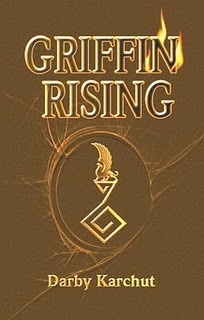
How did you find Twilight Times Books? Did they offer a contract for the series based on the first manuscript? I began submitting my manuscript to both agents and publishers in the spring of 2010. Since Twilight Times Book has a sterling reputation and is well respected among small and mid-list book publishers, I sent them a copy of the manuscript in April and kept my fingers crossed. In June, I was offered a contract. Subsequently, I have also signed a contract for the next book in the series, Griffin’s Fire.
How do you market your books? It is a multi-pronged approach. Prior to release, I sent out close to 80 copies to various YA book bloggers, reviewers, and local bookstores as well as networking within the YA book world via my own blog and website. Anything and everything to get a “buzz” going. As the school year begins this coming fall, I will also be doing author visits to various middle and high schools in my area. My publisher also sent advanced readers copies to the well-known book reviews such as Library Journal, Foreword, School Library Journal, Booklist, Publisher’s Weekly, and so on.
I understand you’re working on the sequel, Griffin’s Fire. When will this one be out? The release date is tentatively scheduled for April 2012.
Is there anything else you’d like to share with us? I would encourage anyone interested in writing YA books to read extensively in that genre. Best thing you can do as an author is saturate your mind with good writing. There is an old saying: you read and you read and then one day, you throw up a book. Inelegant, but so very true.
Learn the rules of writing, then break them as necessary to make your story better. Everything is about The Story.
Thanks, Darby!
Thank you, Mayra. I had a terrific time visiting with you.

A New Exciting New Penguin Series for Kids!
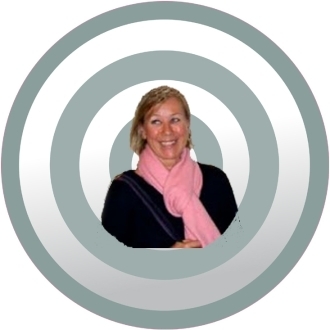 After a career in the corporate world, Charlotte K. Omillin decided to dedicate her time to writing and illustrating stories for children. She’s the author of The Adventures of Zeppi series. A lover of nature and the environment, Omillin interweaves the ecological theme in her series. In it, Zeppi the penguin and his friends learn how to take care of our planet.
After a career in the corporate world, Charlotte K. Omillin decided to dedicate her time to writing and illustrating stories for children. She’s the author of The Adventures of Zeppi series. A lover of nature and the environment, Omillin interweaves the ecological theme in her series. In it, Zeppi the penguin and his friends learn how to take care of our planet.
Over the years, Omillin has attended several Academies of Arts in Belgium for drawing, painting, and film animation courses. In addition, she’s been a member of several critique groups. She also writes for young adults. You may contact the author at omillinplanet@gmail.com. Download free coloring pages of Zeppi at http://theadventuresofzeppi.wordpress.com.
Thanks for this interview, Charlotte! It’s a pleasure to have you here to talk about your new series for kids. What was your inspiration for Zeppi? How would you describe him?
I once knew a little boy who was crazy about penguins and I made up stories for him. After each tale he asked me, “What happens next?” That’s when I started structuring my ideas and writing down the tales.
Who is Zeppi? He’s a young Adelie penguin born in a zoo. That’s the only environment he knows, surrounded by his parents and his penguin buddies. Zeppi is good hearted and friendly but also curious, impulsive, and a little opinionated. As he tends to know everything, he gets easily entangled in complicated situations and then learns at his own expense. Young Zeppi is impatient to live and speak like humans. His ecological-minded friend, Alesdor, shows him how easy it is to respect planet Earth.
Zeppi also loves to sing and to eat desserts (anything with chocolate will do!).
Zeppi sounds adorable and I love the ‘green’ angle in your series. I understand the first two books in The Adventures of Zeppi have been published. Tell us a little about the stories and what ties them together.
Zeppi is rescued by a boy, Alesdor, who believes a miracle happened the day he found a penguin in his backyard. So he decides to keep his new friend and hides him in his tepee.
Zeppi and ecological-minded Alesdor will adopt each other and grow together. The stories are also about friendship and acceptance of others’ differences.
Throughout the adventure series, Zeppi becomes an eco-friendly-penguin. Young readers will understand how fun and easy it is having the ‘green attitude’. Children say they’re ready to change their habits but don’t like the negative way the environment issues are presented to them.
I agree with that last statement. What are the reading level and target audience for the series?
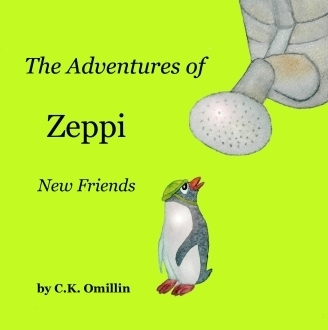 It would say children aged 5-8 years old. Parents and teachers, who are sensitive preserving our planet, will enjoy the books too.
It would say children aged 5-8 years old. Parents and teachers, who are sensitive preserving our planet, will enjoy the books too.
How many books will there be in the series?
There are 24 adventure stories. The first two are already published, and I’m actually working on the illustrations of book number three.
Wow, you must be busy 24/7! That’s a lot of books. Let’s talk about books 1 & 2. I understand that, besides writing the stories, you also did the artwork. Can you describe what your creative process was like? Did you write the stories first or did you do the art as you wrote them?
Yes, I really wanted to do the artwork myself as I have a clear picture of Zeppi in my mind.
As I said before, I made up the stories for a little boy. Then, after seeing a documentary on Antarctica and penguins, I had a bad dream. A little penguin got captured and was separated from his buddies. He was honking, honking, honking in his cage trying to get out. I woke up, wrote the story, and made a few sketches of Zeppi. Then I had to invent the locations for the stories. I drew a huge map with all the towns Zeppi discovers during his stay with Alesdor. The map was a help to invent the 24 tales.
Where are the books available for purchase?
The books and notebooks are available on: http://www.blurb.com/user/store/kath_dem and www.omillinplanet.com.
Do you have a website where readers may learn more about you and Zeppi?
Yes, my website is www.omillinplanet.com and that’s also the blog where Zeppi publishes his green tips whenever he has time and isn’t gone somewhere on an adventure.
Why do you think most people love penguins?
There’s a mutual fascination between children and penguins. When I started drawing Zeppi, I made a visit to the zoo to observe and study the penguins’ postures and movements. I’d arrived early at the zoo to take pictures before the crowd arrived. But the penguins were sleeping and I just sat there drawing and hoping one of them would wake up and wobble 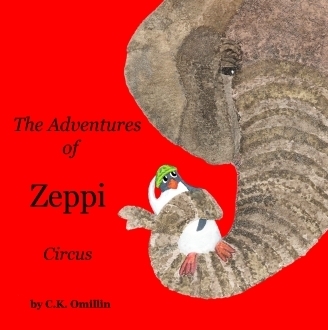 around. A half hour later, I decided to leave when high pitched voices of a group of children woke up the penguins. The children glued their faces to the aquarium glass. And the magic happened! The penguins had their favorite audience. A few penguins jumped in the water showing off their swimming performances, making circles in the water, and jumping out again. Others waddled around ruffling their feathers. The more the children shouted the more the penguins showed off. The accompanying adults had as much fun as the children. I think penguins are so likeable.
around. A half hour later, I decided to leave when high pitched voices of a group of children woke up the penguins. The children glued their faces to the aquarium glass. And the magic happened! The penguins had their favorite audience. A few penguins jumped in the water showing off their swimming performances, making circles in the water, and jumping out again. Others waddled around ruffling their feathers. The more the children shouted the more the penguins showed off. The accompanying adults had as much fun as the children. I think penguins are so likeable.
That’s a cute story, Charlotte! It seems penguins love an audience. Is there anything else you’d like to share with my readers?
In fact, I would love your readers to share their thoughts on Zeppi and on his efforts to become an ecolo-friendly penguin. I’ll answer all e-mails sent to Zeppi’s site www.omillinplanet.com, or directly to my e-mail: omillinplanet@gmail.com
Thank you, Mayra for your interest in Zeppi.
Thank you, Charlotte, and best of luck with the series. Sounds like a winner!
Note to readers: Do you have or know a child who loves penguins? Don’t forget to download free coloring pages of Zeppi at http://theadventuresofzeppi.wordpress.com/
Interview with Chris Karslen, author of GOLDEN CHARIOT
Chris Karslen was born and raised in Chicago. Her father was a history professor and her mother was, and is, a voracious reader. She grew up with a love of history and books. Her parents also loved travelling, a passion they passed onto her. Karslen wanted to see the place she read about, see the land [image error]and monuments from the time periods that fascinated her. She’s had the good fortune to travel extensively throughout Europe, the Near East, and North Africa.
She’s now a retired police detective who spent twenty-five years in law enforcement with two different agencies. Her desire to write came in her early teens. After she retired, she decided to pursue that dream. She currently lives in the Pacific Northwest with her husband, four rescue dogs and a rescue horse.
Thanks for this interview, Chris! When did your passion for thrillers and action/adventure fiction begin?
I don’t know if I could put a specific timeframe to my interest. I can’t remember a time it wasn’t there. As a child, I loved the old horror movies where folks were chasing or running from the Mummy or Dracula etc. and the thrillers like North by Northwest, The Man Who Knew Too Much, and Manchurian Candidate. When I got into my teens, James Bond became popular. I loved the movies and devoured Ian Fleming’s books. Along that same vein, I enjoyed The Jackal, and Three Days of the Condor. Who didn’t love Indiana Jones? Now, I can’t wait to see movies like The Avengers, Iron Man, The Bourne Identity and still love the Bond movies.
When did you decide you wanted to become an author?
I wanted to write since I was a teenager. But by the time I was ready for college I lacked the confidence to try so I went with the “safe” route and became a business major. Once I retired, I was ready to take a risk and live my dream.
Tell us about your latest novel, Golden Chariot.
[image error]The heroine, Charlotte Dashiell, is a nautical archaeologist. She’s working on her Doctorate in that field. Her thesis is very controversial and approval by the Doctoral Committee for her thesis is at risk if she doesn’t find evidence to support it. A shipwreck found off the coast of Turkey may hold her proof. She manages to obtain a position on the recovery team. En route, the Turkish government agent assigned to the wreck is murdered and she is on the scene at the time it occurred. Her close presence at the time of the crime coupled with a loose connection to a private collector of black market artifacts makes her a person of interest to the Turkish authorities. Atakan Vadim, the hero, is the Turkish agent sent to investigate her further. He becomes her dive partner. As the story progresses, he discovers smugglers plan to steal certain high value relics from the wreck and frame Charlotte for the theft. He also learns the thieves plan to murder her in the process. For her own safety, he presses her to leave the recovery team. She refuses. If she leaves, she loses all hope of finding proof of her thesis. Together, he and Charlotte work to find out who is behind the smuggling operation. During the course of the story, the relationship between the two turns from one of wariness and distrust to friendship, trust and love.
What made you decide to set it in Turkey?
I love Turkey. I’ve visited several times. I knew after the first time, I would set a story there. It’s such a fascinating country. In Istanbul, the exotic Ottoman architecture mixed with the modern immediately captures your interest. There’s the hustle and bustle of the bazaars, which I enjoy, especially the Spice Market. It’s a colourful place. You can’t throw a rock in Turkey and not hit something historical. Their history goes back to the Bronze Age. Turkey’s been part of the Hittite Empire, the Roman Empire, the Byzantine Empire, the Ottoman Empire and a secular, independent modern nation. The people are nice. The food is excellent. The landscape is remarkable in its variance. There’s the beautiful coastal area along the Aegean Sea and the Eastern Mediterranean and the starkly different coastline on the Black Sea. The region of Cappadocia with its fairy chimneys and underground cities is other worldly in appearance. To the east are mountains and grassy plains.
Did you have to do a lot of research about police procedural there?
Not police procedural per se. Atakan is actually a representative of the Turkish Ministry of Culture and Tourism. I was fortunate enough to have a contact/advisor who is an archaeological diver and Turkish. He told me that all legitimate archaeological sites in Turkey have a representative of the Ministry present to watch over the safety of the site and relics. I took some dramatic license and gave Atakan more police authority than he’d have in real life. For the SWAT operation, I did research weapons used by the Turkish authorities and how they would interact with our military stationed at Incirlik Air Force Base in Turkey to obtain intelligence information needed. Again, I was lucky. I have a friend who headed up a SWAT team for a major US city and who was a Marine reserve who served in Iraq and trained our soldiers in urban-crisis entries. My friend was familiar with how the flow of intelligence gathering is handled. He also advised me on some of the SWAT tactics.
There are a lot of Turkish words in the story. Do you speak Turkish?
No. I’d like to learn. I do have the Rosetta Stone program for Turkish but it is an extremely difficult language. It uses the Latin alphabet that we are familiar with but the conjugation and pronunciation is not what you’d expect. My Turkish diver friend helped with the translation as did another Turkish friend who’s a tour guide. I cannot understand it when spoken to me (rarely anyway). I am better at reading it and then I really only know some basic words and phrases.
I found the myth about Troy fascinating. To this day, do they know for a fact that Troy existed?
Yes, Troy definitely existed. There have been archaeologists working the site for many decades. When we speak of Troy, it usually the kingdom associated with the Trojan War. At the time the war was supposed to have taken place, the kingdom was known as Wilusa and part of the Hittite Empire. Excavation at the site is ongoing and they have made some incredible discoveries in the last couple of decades. *I should mention that not all archaeologist/historians agree that the war occurred. Personally, I tend to believe those who do think it happened.
There are many underwater scenes in the story. Do you scuba dive?
No, I don’t dive. I had the benefit of an archaeological diver to advise me. I also did a lot of research on the subject and had books that documented many shipwreck recovery projects. The books had pages of pictures showing the divers working a wreck. I had pictures of the entire process from building the camp to cleaning the relics. Twice I’ve been to INA (Institute of Nautical Archaeology) in Bodrum, Turkey. I was given a tour of the facility and shown some of their photos, the conservation lab, the desalination tanks and the hard work and time involved in the piecing together of artifacts.
How long did it take you to write Golden Chariot?
Two and a half years, mainly because of the research. While I worked on one of my paranormal romances, I began the research for Golden Chariot. I’d done eighteen months of research before I wrote a single word. Then, I did several drafts over the next year before I was happy with the result.
Are you disciplined?
Yes, for the most part. I have to admit that I do have days when the smallest shiny object can distract meJ I do try to get some writing in at least 6 if not 7 days a week. I don’t always get the number of pages done I want. Some days I consider it a success if I get a few paragraphs finished but I try to make an effort.
Describe a typical writing day for you.
I try hard to get all my errands and appointments done in the morning. Then, I take a break and have a bite to eat. I am usually at my desk by 12:00 or 12:30. I work on promotion, answer emails and try to read at least a few chapters of stories from writer friends for review purposes. After that, I pull up my work in progress. I read the last few pages I wrote to get my head in the same place again. I spend the next 4 or 5 hours writing or rewriting as needed. That’s a typical “good” day. Like I said, there are those days I spend hours writing, deleting... sighing...writing, deleting and again...sighing.
What is the most rewarding aspect of being an author?
When a reader tells you how you’ve moved them or which character or scene they loved. It’s so wonderful to have a reader say “I felt like I was there.”
What advice would you give to aspiring authors?
Writing is hard work. You’ll have days that are pure frustration, days that you can’t seem to get three lines right. Keep at it. Keep studying the craft. Every workshop I attend, I take something useful away. If you’re stuck on how to approach a scene, one thing I find that helps is to read a similar scene by an author you like. Analyze what you like about it and how they handled the scene and see if you can recreate the feel in your story with your spin.
What’s on the horizon for Chris Karslen?
I am currently working on book three of my Knights in Time series. The first two are: Heroes Live Forever and Journey in Time. This is a paranormal romance series. I hope to have my current story, Knight Blindness, done and ready for release later this year. I’ve also finished the draft of the sequel to Golden Chariot. I hope to have the final finished and ready to publish early next year.
This interview originally appeared in Blogcritics.

Interview with Kaylin McFarren, author of Severed Threads

Please welcome my special guest, romantic suspense author Kaylin McFarren. I recently had the chance to read and review her latest novel, Severed Threads, and I have to say it is an entertaining, thrilling read. Kaylin was generous enough to take time out of her busy schedule to answer my questions about her book and her writing. I hope you'll enjoy the interview!
About the author
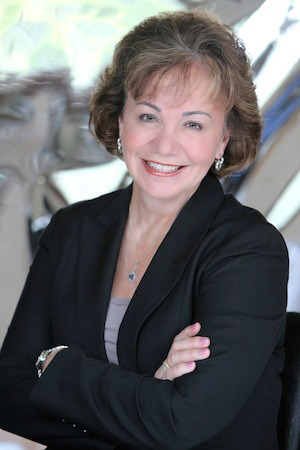 A native of California, Kaylin McFarren has traveled around the world and is now settled in Oregon.
A native of California, Kaylin McFarren has traveled around the world and is now settled in Oregon.As the director of a fine art gallery, she assisted in developing the careers of numerous visual artists who under her guidance gained recognition through promotional opportunities and in national publications. Eager to unleash and develop her own creativity, she has since channeled her energy toward writing novels. As a result, she has earned more than a dozen literary awards and was a 2008 finalist in the prestigious RWA® Golden Heart contest. She is a member of RWA, Rose City Romance Writers, and Willamette Writers.
Thanks for this interview, Kaylin! Do you consider yourself a born writer?
Definitely. Since the age of eight, I've loved to write stories and have been filled with an active imagination.
What compelled you to start writing professionally?
Like many authors, I was originally inspired to write my first novel after reading a great book and seeing an amazing movie. Mine happened to be Memoirs of a Geisha and The Notebook, which will always be my favourites.
Severed Threads is full of romance, suspense and danger. What was the most challenging aspect of writing this romantic thriller?
The most difficult task to writing a suspense story is to keep the action moving while revealing character traits and emotions along the way. Severed Threads contains an array of characters and each serve their purpose in revealing a twisting and turning plot that ultimately leads to a pleasant resolve. However, keeping the voices of each person unique also proved to be a challenge.
Tell us something about your hero and heroine that my readers won't be able to resist.
Chase Cohen is a handsome, womanizing, thrill-seeking treasure hunter who has found his greatest challenge and true love in Rachel Lyons. But she doesn't trust Chase for good reasons and won't be easy to win over.no matter how hard he tries.
What did you find most fascinating while researching underwater archaeology and ancient Chinese treasures?
I had no idea how much gold had been lost at sea. According to Greg Stemm, co-founder and co-chairman of Odyssey, there's billions of dollars scattered beneath the ocean. However, much of the ocean floor is unexplored and unmapped and global imaging shows crushing depths ranging up to six miles. And there could even be gold or diamond mines that far surpass what anyone on earth could imagine. Since trade included priceless collectibles and dishware from China as well as gold and silver, these were lost along with ships that sank during storms and battles hundreds of years ago and many will never be recovered.at least not in our lifetime.
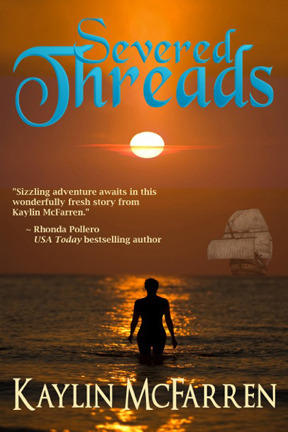 How long did it take you to write the novel and did you work from an outline?
How long did it take you to write the novel and did you work from an outline?It took me close to two years to write Severed Threads. This included the time needed to research details and edit my final manuscript. I typically create a synopsis and then write by the seat of my pants. I'm not big on storyboards and planning, as I'm too anxious to get my stories on paper.
What was the editing process like?
Although I tend to edit as I go, I eventually asked three published authors and two experienced readers to assist with my initial editing before hiring a professional editor to review my manuscript. After taking all of their advice into consideration, I fine-tuned my writing and sent it in for publication, hoping I'd done my best in creating a fast-paced, entertaining tale.
What advice would you give to first-time novelists who are just starting to market their books?
Spend a little extra time in researching your options. If you chose to approach a publishing house, be sure the agents you contact are experienced in your genre and have a great track record. If you decide to self-publish, be prepared to spend a little extra money and time in promoting your titles as well as yourself.
What's on the horizon for Kaylin McFarren?
I'm currently completing the second book in the Threads series - Buried Threads - and will be following this with a third - Banished Threads. I've enjoyed my characters so much in my first installment that I decided to take them on adventures around the world and have been urged to do so by readers who follow my stories.
Is there anything else you'd like to share with my readers?
Keep reading and if you enjoy the work created by an author, be sure to let them know. Your praise and support encourages every author to write!
Thanks, Kaylin!
Find out more about Severed Threads on Amazon.
View the original article on blogcritics.org
5 Questions with Melodie Campbell, author of Rowena and the Dark Lord
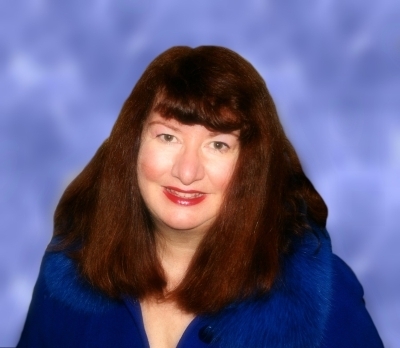 Melodie Campbell achieved a personal best this year when
Library Digest
compared her to Janet Evanovich.
Melodie Campbell achieved a personal best this year when
Library Digest
compared her to Janet Evanovich.Melodie got her start writing comedy (stand-up and columns.) In1999, she opened the Canadian Humour Conference. She has over 200 publications including 100 comedy credits, 40 short stories and 4 novels. Her fifth novel, a mob caper entitled The Goddaughter’s Revenge (Orca Books) will be released Oct. 1. She has won 6 awards for fiction, and was a finalist for both the 2012 Derringer and Arthur Ellis Awards.
Melodie is the Executive Director of Crime Writers of Canada. Her humour column ‘Bad Girl’ appears in The Sage .
Connect with Melodie on the web:
www.melodiecampbell.com
www.funnygirlmelodie.blogspot.com
Facebook: MelodieCampbellAuthor
Twitter: @MelodieCampbell
Q: Welcome to the Dark Phantom, Melodie! Tell us why readers should buy ROWENA AND THE DARK LORD.
A: Need a laugh? Want to escape? That’s what I’m all about. I’m a former comedy writer who has gone over to the dark side of writing comic fantasy. ROWENA AND THE DARK LORD is a rollicking adventure novel, with romance, adventure, magic and sex…and hopefully you will find it ‘Hot and Hilarious” as many reviewers called the first book in the series.
Q: What makes a good comic time travel novel?
A: Fast and lean writing. A protagonist you like and want to be for a little while. OH, and maybe a few attractive warrior men to bring up the heat. But really, I think the trick to writing any novel is to provide the reader with an entertaining escape.
I write in first person. I like the reader to *become* the protagonist, to be pitched into Rowena’s head and experience what she does. That’s entertainment.
Q: What is a regular writing day like for you?
A: I’m the Executive Director of Crime Writers of Canada, so I have a day job. My writing, like many authors, is done mainly at night, from 8 until midnight, and on weekends.
I tell my writing students that writing takes time, and you have to give up something if you want to write. So I gave up the gym. And housework. I’m quite happy, really.
Q: What do you find most rewarding about being an author?
A: I’ve won six awards for fiction – BUT – have to admit - the most rewarding day of my writing life was very recent, when a reader found my email address and wrote to tell me that ROWENA THROUGH THE WALL (first in the Land’s End series) was the best book she had ever read. I actually cried. That’s the best reward I can imagine. And readers like her are the reason I continue to write.
Q: What’s the best writing advice you’ve ever received that you’d like to pass to other authors?
A: Writing is work – hard work. Be prepared for that. We all think it should be easier, but it’s not. Sometimes, in those magic moments, it doesn’t seem like work, and that is grand. Those are the moments we live for.
----------------------------------------------------------
Dark magic…dark passions….
When Rowena is abducted from Arizona and taken back to medieval Land’s End, one thing is clear: she must learn to control her powers of magic. It isn’t easy being a modern girl in an archaic land, and when Rowena accidently conjures up a Roman Legion in mid-battle, Land’s End is on the brink of a war that could jeopardize everything and everyone she loves.
The stakes are raised when the Dark Lord reappears and traps Rowena in a cyclone of lust and passion. Once again, she is torn between the man she loves and the mage who fires her desire.
Purchase the book on Amazon.
Currently #2 Timetravel in Canada! Top 100 in US!




Interview with Terry Jackman, Author of 'Ashamet, Desert-Born'
 Terry Jackman was christened Teresa, and is married with kids. She’s not pretending to be a guy just for the book. It’s just that nobody, but nobody, calls her anything but Terry, so Terry is actually the most honest name to put on the cover.
Terry Jackman was christened Teresa, and is married with kids. She’s not pretending to be a guy just for the book. It’s just that nobody, but nobody, calls her anything but Terry, so Terry is actually the most honest name to put on the cover.To go with her two names she inhabits two worlds. In one she’s a mild-mannered lady who tutors children and lives in a pretty English village, called Lymm. [It’s not far from the Manchester United football ground. You can take a peek at it on www.lymmvillage.co.uk/gallery If you look carefully at the picture of the old stone cross in the village centre you might see the ancient stocks below, where villagers would have thrown rotten eggs etc at local miscreants – but we don’t do that now, honest.]
In the other, she’s written articles and study guides, is secretly on the committee of the British Science Fiction Association, coordinates all their online writers’ groups, writes a regular page for Focus magazine and reads submissions for Albedo One magazine in Ireland. Oh, and has been known to do convention panels and some freelance editing.
When Ashamet goes public the two worlds will finally collide. She suspects there’ll be some raised eyebrows so she’s stocking up on fortifying tea and biscuits – and lots of chocolate!
Q: Congratulations on the release of your latest book, Ashamet, Desert-Born. What was your inspiration for it?
A: Honestly, it was bad temper. I got really cross that a writer made the all-powerful prince in her story stupid, basically to make the plot work out the way she wanted, where if he’d had an ounce of sense it would have fallen apart. Why, I fumed, did powerful characters so often have to be bad, stupid or both? And just like that Ashamet walked onstage. He’s lots of things, but he’s definitely not stupid.
Q: Tell us something interesting about your protagonist.
A: Maybe you know someone who says one thing and does another, or is different things to different people? Or maybe they hide their true character, even from themselves? That’s Ashamet. He’s also about the fact that even those who seem all powerful are still bound by some restrictions, and that in the end it’s how they cope with those that defines who they really are?
Q: How was your creative process like during the writing of this book and how long did it take you to complete it? Did you face any bumps along the way?
A: Ashamet, Desert-Born took several years to write. The first fifty pages came in a mad rush then I had stops and starts, because while Ashamet and Keril arrived fully formed, the world they lived in didn’t. It took me at least three tries to define the society Ash was born into well enough to make total sense of who he was. I couldn’t finish the story till I got that right.
Q: How do you keep your narrative exciting throughout the creation of a novel?
A: Ah, an easier answer. I listen to my characters. If it’s not what they’d do, or say, then out it goes. Otherwise the story loses its credibility, just like that stupid prince I mentioned. The story slumps, and frankly I get bored writing it.
Q: Do you experience anxiety before sitting down to write? If yes, how do you handle it?
A: Actually, no. I get anxious about showing stuff to others but not about writing it. Some days I can’t wait to write, others I have to remind myself there’s a deadline, but after the first couple of sentences I’m usually in the groove. I’m no longer aware of what I’m doing, as long as I’m not interrupted.
Q: What is your writing schedule like and how do you balance it with your other work and family time?
A: I have a VERY flexible schedule, because it depends largely on when my husband is playing golf! Crazy as it sounds, and I know it does, I can write around strangers, on trains, around other writers – but not around people I know well but aren’t also writing (otherwise known as friends and family). When they walk out the door I reach for pen or keyboard.
Q: How do you define success?
A: Success was selling my first three articles in one week, then turning one of them into a series. Less successfully, that ambushed me. Regular requests for more got me writing nonfiction for ten years. Between a more than full time job and articles I had no time to try fiction.
So an even greater success was having Dragonwell ask, out of the blue, if I’d “like to send them something” because they’d heard about me from another writer. Wow.
And the final and greatest success will be if people like reading the result, and take a second to review it or tell me so.
Q: What advice would you give to aspiring writers whose spouses or partners don’t support their dreams of becoming an author?
A: It will make it harder but it doesn’t mean they shouldn’t go for it, if they’re sufficiently driven. Hey, I grew up in a house without books and look where I ended up. Due to my extreme shyness problem my family didn’t even know I wrote for several years, till I was selling articles regularly.
And in the end I only owned up about fiction because an amazing author/university lecturer, Adam Roberts, said “You are a writer”. After that even I had to ‘come out’.
But it helps a lot if people at least humor you.
Q: George Orwell once wrote: “Writing a book is a horrible, exhausting struggle, like a long bout of some painful illness. One would never undertake such a thing if one were not driven on by some demon whom one can neither resist nor understand.” Do you agree?
A: Gosh no. Hearing strange voices in your head. Spending hours writing, assessing, rewriting. Crying over those nasty critiques – which are right, damn them – editing, polishing… How could that possibly be exhausting?
Seriously, sometimes it’s exhilarating, others depressing. So yes, I can’t imagine anyone doing it if they aren’t driven to. Me, I have to get those voices out of my head before they drive me mad.
Q: Anything else you’d like to tell my readers?
A: Well, I guess I should tell people who don’t know me that Terry is actually short for Teresa, but that I regard Terry as my real name. I’m definitely NOT pretending to be a guy for my publisher. Since no one calls me anything but Terry, if I’d put Teresa on the book cover it would have felt more like hiding who I was, not less.
So unlike most of my characters I’m female, and as you’ll have gathered married with kids. I’ve visited some beautiful Moorish architecture, but I’ve never ridden a camel. In fact I’ve only once ‘sat’ on a horse. But hey, if we only wrote what we already knew science fiction and fantasy wouldn’t exist.
But I hope, very much, readers will enjoy reading Ashamet as much as I enjoyed writing it, and maybe tell me so, so I can breathe easier.
ABOUT THE BOOK
Title: Ashamet, Desert-Born
Genre: Fantasy/adventure/romance/paranormal
Author: Terry Jackman
Website: www.terryjackman.co.uk
Publisher: www.dragonwellpublishing.com
Find out more on Amazon
A desert world. A warrior nation that worships its emperor as a god. But for Ashamet, its prince, a future filled with danger...
Ashamet is confident his swordsmanship, and his arranged marriage, will be enough to maintain the empire’s peace. But when a divine symbol magically appears on his arm, closely followed by an attempt on his life, he no longer knows who to trust. Worse, the strange attraction he feels toward a foreign slave could be another trap. As events unravel, too fast,Ashamet must find out if this innocent young male is a tool for his enemies--or the magic key to his survival.
"Ashamet, Desert-Born" is a debut adventure fantasy with an exotic Arabian-style setting and elements of same-sex romance.
The Writing Life with Jane Tesh, Author of ‘Butterfly Waltz’

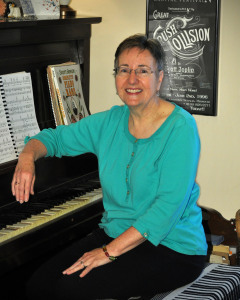 Jane Tesh is a retired media specialist and pianist for the Andy Griffith Playhouse in Mt. Airy, NC, the real Mayberry. She is the author of the Madeline Maclin Series, A Case of Imagination, A Hard Bargain, A Little Learning, and A Bad Reputation, featuring former beauty queen, Madeline “Mac” Maclin and her con man husband, Jerry Fairweather. Stolen Hearts is the first in the Grace Street Mystery Series, featuring PI David Randall, his psychic friend, Camden, Randall’s love interest, Kary Ingram, and Cam’s career-driven girlfriend, Ellin Belton, as well as an ever-changing assortment of Cam’s tenants. Mixed Signals is the second in the series, followed by Now You See It and Just You Wait. Jane’s mysteries are all published by Poisoned Pen Press, located in Scottsdale, Arizona.
Butterfly Waltz
is her first published fantasy novel from Silver Leaf Books. All of Jane’s books are on the light side with humor and romance.
Jane Tesh is a retired media specialist and pianist for the Andy Griffith Playhouse in Mt. Airy, NC, the real Mayberry. She is the author of the Madeline Maclin Series, A Case of Imagination, A Hard Bargain, A Little Learning, and A Bad Reputation, featuring former beauty queen, Madeline “Mac” Maclin and her con man husband, Jerry Fairweather. Stolen Hearts is the first in the Grace Street Mystery Series, featuring PI David Randall, his psychic friend, Camden, Randall’s love interest, Kary Ingram, and Cam’s career-driven girlfriend, Ellin Belton, as well as an ever-changing assortment of Cam’s tenants. Mixed Signals is the second in the series, followed by Now You See It and Just You Wait. Jane’s mysteries are all published by Poisoned Pen Press, located in Scottsdale, Arizona.
Butterfly Waltz
is her first published fantasy novel from Silver Leaf Books. All of Jane’s books are on the light side with humor and romance.Connect on the web:
https://www.facebook.com/GraceStreetMysterySeries
https://twitter.com/janetesh
http://www.janetesh.com/fantasy.html
What’s inside the mind of a fantasy author?
An amazing amount of “What if?” What if flowers could talk? What if an evil creature wants to be good? I explore these in Butterfly Waltz, but there are many more what ifs out there.
What is so great about being an author?
You can’t control your real life, what will happen, what people do or say, but you are in complete control of your fantasy world.
When do you hate it?
I can’t think of a single time when I hate it.
What is a regular writing day like for you? Be honest!
I get up at 6:30 and go for a walk in my neighborhood. Around 8, I get to work in my office and work until 11:30 or 12. Then I have lunch and spend some time with my Chihuahua, Pearl, until 1. From 1 until 3 I work some more and then I stop. If a story is going really well, I might work on it after supper. I look forward to being in my office. I don’t have a phone down there, and I disconnected the door bell, so it’s nice and quiet. Occasionally, Pearl will sit in my lap while I type.
Do you think authors have big egos? Do you? How do you know?
Hmm, well, I think authors have to believe in themselves and their work or they’d never get anywhere. I’d say I have a reasonable ego, especially now that I’ve been published. It’s given me the confidence to continue my writing career.
How do you handle negative reviews?
I try not to read any reviews. Everyone has an opinion, and I can’t make people like my work, so it’s better just to chug ahead and not read good or bad reviews.
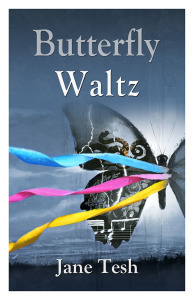 What is the usual response when you tell a new acquaintance that you’re an author?
What is the usual response when you tell a new acquaintance that you’re an author?People never fail to say one of two things, either, “Oh, I’ve always wanted to write a book,” or “My cousin/nephew/uncle/whatever has written a book about our family history/his experiences as a button collector/her life as a mountain midwife.” Stuff like that. Every time.
What do you do on those days you don’t feel like writing? Do you force it or take a break?
I’m usually working on several stories, so if one isn’t working, I switch to another. If the well is dry that day, I don’t force it. I do something different like mow the lawn or play the piano.
Any writing quirks?
As my editor loves to remind me, I use too many “just,” “some,” “well,” and “I knew.” I’m always rooting those out.
Have you worked on your novel intoxicated? What was the result?
Nope, not a drinker.
What would you do if people around you didn’t take your writing seriously or see it as a hobby?
I’m going to write no matter what, so people can think whatever they like. I’m okay with that.
Some authors seem to have a love-hate relationship to writing. Can you relate?
I’ve always loved it.
Do you think success as an author must be linked to money?
The thrill of opening a box of my latest books, seeing my work in a form I can hold and put on a shelf is worth more to me than any amount of money. I get paid royalties, but even if I didn’t, I would still write because it’s so much a part of me.
What had writing taught you?
No one takes your work as seriously as you do, so lighten up a little.
Leave us with some words of wisdom.
My favorite author, Terry Pratchett, says, “The first draft is just you telling yourself the story.”
Don’t worry about making it perfect. No matter how rough it is, it can be fixed. And a writer must have persistence. It took me a very long time to get published, but I never gave up.
Interview with JJ Sherwood, Author of 'Kings or Pawns'

 On a cold winter night, wind howling into the desert sky, one ordinary hospital gave witness to a historic event. JJ Sherwood was born at 2:30 a.m. on December 31st, just barely managing to squeeze in to supplant New Year’s Eve. JJ has always had a flair for the dramatics.
On a cold winter night, wind howling into the desert sky, one ordinary hospital gave witness to a historic event. JJ Sherwood was born at 2:30 a.m. on December 31st, just barely managing to squeeze in to supplant New Year’s Eve. JJ has always had a flair for the dramatics.Sherwood began writing in the womb after a harrowing incident in which Mother Sherwood swallowed a pen—and thus, destiny was born. JJ’s first work was completed by the age of 5: a riveting tale of a duck attempting to climb into an apartment during the pouring rain. Unfortunately this book is not in print, but it served as the first spark that spurred on a lifetime of creativity.
Much of JJ’s childhood was spent tearing through the woods, playing out fantasy worlds, and tying Barbie to the roof so that the Power Rangers might rescue her. Middle and high school carried on this roleplaying, while college encompassed creating and refining over 250 characters in the world of Aersadore.
After escaping college, finally armed with the tools of the trade and a lifetime of development, JJ set to writing what would become the Steps of Power series: it was then that Eraydon slew his first dragon, Jikun battled the warlord Saebellus, and Taranus rebelled against his brother’s throne.
When not orchestrating the lives and deaths of the people of Aersadore, JJ’s hobbies include drawing, video gaming, wearing a bathrobe, and eating too many baked potatoes. JJ Sherwood lives in Cincinnati, Ohio with one loving and extremely patient spouse, a bearded dragon, a monk parakeet, and four cats who look far too similar.
Q: Congratulations on the release of your book, Kings or Pawns. To begin with, can you gives us a brief summary of what the story is about and what compelled you to write it?
A: As with any intrigue/suspense, the less you know, the better. The story is about an elven nation riddled with corruption and balanced on the brink of all out war with enemy warlord Saebellus. I have always loved the fantasy genre but have been disappointed by the lacking number of fantasy books geared for adults. Having grown up on Dragonlance, I always hoped to find a series as large and complicated, full of strong characters, set in a rich world, well-written, engaging, and enthralling—but geared for adults. So that’s what I write now.
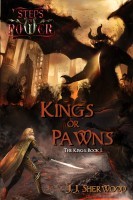 Q: What do you think makes a good fantasy? Could you narrow it down to the three most important elements? Is it even possible to narrow it down?
Q: What do you think makes a good fantasy? Could you narrow it down to the three most important elements? Is it even possible to narrow it down?A: Easy, actually: world-building, realism, and strong characters. I love the fantasy genre, and I believe those three things make or break fantasy.
World building is the scope, history, development, and strength of the world where all of the events and characters take place. Tolkien is a great example of a massive, fully developed history and world that allows readers to delve into a series and find themselves wonderfully lost within the depth of the world—and hungering for more.
Realism is the careful balance between fantasy and believability. In my case, I focus on realism to ensure non-fantasy readers can pick up and fall in love with the book. Even the magic systems—while retaining airs of fantasy— have a foundation of scientific understanding.
Strong characters is the last and possibly most important element—characters who rise above stereotypes and embed themselves into your memory… characters who drive and shape the story by their faults and strengths, heroics and mistakes. Characters whom you can fall in love with.
Q: How did you go about plotting your story? Or did you discover it as you worked on the book?
A: I plotted my story from bullet-point to bullet-point, but as the characters fully drive and shape the story, elements very often shift away from my original plan as characters argue that they “would not have done something quite that way”—and that single shift causes a ripple effect throughout the entire story ’til the end.
Q: Tell us something interesting about your protagonist and how you developed him or her. Did you do any character interviews or sketches prior to the actual writing?
A: There are multiple points of view and multiple protagonists, but I’ll address General Jikun—as his visage is most seen in our series artwork. Jikun was always an arrogant, cynical individual—just since the moment I began thinking he shaped himself that way—and I find once I write the first sentence of a character’s existence, the rest just… materializes and carries forward as though he’s always been a complete and full individual. I have little control over how the characters “create themselves.”
Q: In the same light, how did you create your antagonist or villain? What steps did you take to make him or her realistic?
A: Antagonists/villians have long since been some of my favorite individuals. I find that the most interesting and REAL characters are those that are not “good” or “evil” per se, but rather those characters who have “both traits.” Thus, my antagonist is simply an individual on one side of the coin, with admirable traits and flaws, making him an understandable, complicated, and interesting individual—and I prefer the same thought process with my “good” characters as well, including the aforementioned General Jikun.
Q: How did you keep your narrative exciting throughout the novel? Could you offer some practical, specific tips?
A: I wrote from several points of view and I focused on each point of view as being distinct and entertaining. For example, when writing from General Jikun’s point of view, I infuse a lot of dry humor, cynicism, and metaphors into the writing—readers know they are getting a skewed but unique view of events/characters/the world. Then the next point of view might be from the mute servant girl, Alvena, who is spunky, bubbly, and very optimistic—a stark opposite to General Jikun and a new, fresh look at everything going on. Keeping such strong characters and contrasting points of views allows readers to always feel like they are getting varying perspectives of the world/events/characters. Then they can begin to form their own passions, theories, and opinions: which means the readers can invest in the world and truly feel a part of it.
Q: Setting is also quite important and in many cases it becomes like a character itself. What tools of the trade did you use in your writing to bring the setting to life?
A: I have not read a lot of fantasy in years—and I consider this to be a strong suit. Instead, I focused on interesting studies in linguistics; Japanese; witchcraft, healing, & studies in secluded religions; forensics; astronomy; human anatomy; history; mythology; etc… This allowed me a unique, fresh take on the world not heavily influenced by other writers, but rather thoughts and ideas from cultures and humanity all over our world—and I’ve been developing it for nearly twenty years before the publication of the first novel. It has a history and life entirely its own.
Q: Did you know the theme(s) of your novel from the start or is this something you discovered after completing the first draft? Is this theme(s) recurrent in your other work?
A: The themes of the novels often develop organically based on the strengths and flaws of the characters in the series. In The Kings part of the Steps of Power series, each book has several themes within and the four book series will have an over-arching theme based on the growth and change of the characters involved.
Q: Where does craft end and art begin? Do you think editing can destroy the initial creative thrust of an author?
A: Editing perhaps can, but not in my experience. My editor only helps the series grow stronger—driving points and characters home. There are times we will disagree on what I define as an “artistic” touch (particular wording in a sentence that is done for artistic purposes and not just the “straight forward” information it could be written as), but at the end of the day, the author has the final say.
Q: What three things, in your opinion, make a successful novelist?
A: Determination, hard-work, and natural creativity.
Q: A famous writer once wrote that being an author is like having to do homework for the rest of your life. What do you think about that?
A: It is absolutely true. I have to read my book several times just to keep track of the cycles of the moon, consistencies in linguistics, history, dates, etc… I find myself constantly “studying” my own world and having to take notes about it. I even have calendar books filled with events just pertaining to an individual novel!
Q: Are there any resources, books, workshops or sites about craft that you’ve found helpful during your writing career?
A: Roleplaying. As strange and laughable it might sound to some people: roleplaying. Through roleplaying over the last (nearly) 20 years, I have developed the world, characters, and history of the world to a degree that many authors do not get to reach for years of writing novels and receiving feedback. By roleplaying online and in person with individuals all over the world, I can test history, characters, stories, etc… before they ever even make it into draft form. I can shape and change events for years before they ever touch the pages of a novel and yet not have to slow down the speed at which I write.
Q: Is there anything else you’d like to share with my readers about the craft of writing?
A: I edit my novels about thirty times before they ever end up in your hands—most of those edits involve adding and shaping nuances that allow you to really fall in love with the characters and the world. It is my favorite part of the writing process.
A Conversation with James D. Bell, Author of 'Maximilian's Treasure'
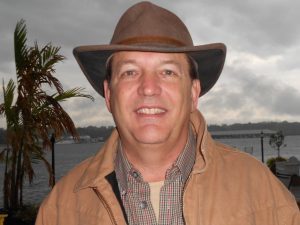
INTERVIEW:
Q: Congratulations on the release of your latest book, Maximilian’s Treasure. To begin with, can you give us a brief summary of what the story is about and what compelled you to write it?
A: It’s based upon an encounter I had with an elderly Choctaw gentleman who told me that Mexican gold intended to help the Confederacy was hidden on his farm. I helped him search his farm. In Maximilian’s Treasure rumors of hidden gold fuel a battle over possession of a Choctaw family farm. Two young lawyers, John Brooks and Jackson Bradley, agree to help the family keep their farm. Early legal success prompts the drive-by murder of the patriarch of the family. The grandson chases the suspects whose bodies are found on the farm, scalped. At the same time, clues to a vast treasure are found on the farm. Jackson, pursued by fortune seekers, adventurers, an exotic beauty and a homicidal maniac follows the clues to a Caribbean reef and then to the Chiapas jungle. John stays behind to defend the grandson and continue the fight for the farm. His efforts are complicated by arson, murder, race riots, and the realization that he lost his one true love. The adventures of John and Jackson rush toward an intertwined triple climax that proves that what happened long ago and far away matter here and now.
Q: What do you think makes a good legal thriller? Could you narrow it down to the three most important elements? Is it even possible to narrow it down?
A: We have an innate desire to see and experience justice. We are offended when the rich and powerful destroy lives and trample the rights of others. We hurt when we see the innocent harmed. Everyone has an inner voice, a sort of lawyer, that alerts us when justice is threatened. If justice fails, the whole world is out of balance. That’s why I became a lawyer. That’s why I became a judge. That’s why I write.
A great legal thriller must incite the reader’s inner lawyer to join the author’s quest for justice. To do that, the reader’s inner lawyer needs a deserving client who has all the odds unfairly stacked against him and an opponent with overwhelming unfair advantage. Justice itself must be at risk if you and the reader don’t find a way to overcome the odds together.
Q: How did you go about plotting your story? Or did you discover it as you worked on the book?
A: I know the beginning and the end of my story when I start. Knowing the end helps me plot an interesting course filled with mystery, action, suspense, comedy and romance. I make an outline and work my way along the outline from one scene to another. Sometimes the story takes on a life of its own, and things occur that I did not expect. That may make me re-write the beginning or change the outline.
Q: Tell us something interesting about your protagonist and how you developed him or her. Did you do any character interviews or sketches prior to the actual writing?
A: My best friend and I were young lawyers defending citizens charged with crimes in Mississippi. We attracted a bit of attention because we kept winning cases. Jack was a loyal friend, an intrepid investigator, and a great researcher. Together we regularly accomplished what at first seemed impossible. Jack died twenty years ago; too young; too soon. I miss him. I brought him back to life in my novels, Maximilian’s Treasure and Vampire Defense. He and I were polar opposites on issues that divide people today, but that’s what made us a great team. I
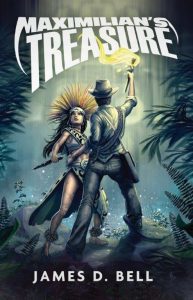 recreate that dynamic between John and Jackson.
recreate that dynamic between John and Jackson.Q: In the same light, how did you create your antagonist or villain? What steps did you take to make him or her realistic?
A: I encountered real villains during my career. I interviewed scam artists, serial murderers, paranoid schizophrenics, devil worshipers and just plain scary people. I draw from that “frightening well” to come up with my antagonists. They’re a bit too real to me.
Q: How did you keep your narrative exciting throughout the novel? Could you offer some practical, specific tips?
A: I love action-adventure. I feel like I’ve done something wrong if I don’t have something exciting happening every few pages. I want the reader to have an “I can’t put this book down” experience. I try to create suspense by having multiple simultaneous intertwined storylines. I interrupt an episode at a critical moment and jump to another storyline, leaving the reader hanging. I want the reader to hurry through the interrupting episode to get back to the suspended scene. My goal is to get the reader hooked on the interruption and suspend it at a critical moment.
Q: Setting is also quite important and in many cases it becomes like a character itself. What tools of the trade did you use in your writing to bring the setting to life?
A: Write what you know about. I use my hometown along with the woods, rivers, jungles and lakes I have explored. I write about adventures I have lived. In Maximilian’s Treasure, I dove the reefs, crossed the river, climbed the cliff, hung by my fingernails over the precipice, entered the cave behind the waterfall and …
You don’t have to do everything you write about, but describing things you know is a good way to bring life to your story.
Q: Did you know the theme(s) of your novel from the start or is this something you discovered after completing the first draft? Is this theme(s) recurrent in your other work?
A: In the past, every book and movie had a “moral to the story.” I feel we have lost some of that. I write to put the moral back into the story. The themes I explored in Maximilian’s Treasure include: 1. What happened five hundred years ago, two hundred years ago, and last year matters today. 2. What happens in distant places matters everywhere. 3. Things are not always what they seem. 4. There are many kinds of treasure, some far more valuable than gold. 5. Christians can work with and be friends with people who do not share their faith without being “judgmental”. 6. God actively intervenes in our lives.
Q: Where does craft end and art begin? Do you think editing can destroy the initial creative thrust of an author?
A: Storytelling is both craft and art. Craft comes from study and experience. Art is an act of creation springing from the mind. Editing should refine, not redefine, your work.
Q: What three things, in your opinion, make a successful novelist?
A: Success is in the eye of the beholder. Make sure that you are judging your success on your own scale. If I had to limit my comment to three measures of success; 1) Envisioning a story that has positive impact on the life of a reader; 2) Completing the story you envisioned; 3) Observing your story having positive impact on a reader.
Q: A famous writer once wrote that being an author is like having to do homework for the rest of your life. Thoughts?
A: Yep. Use every opportunity to learn more about your subject, and write, write, write.
Q: Are there any resources, books, workshops or sites about craft that you’ve found helpful during your writing career?
A: As I was finishing my first novel, I took a night course at Millsaps College titled, “How to Sell What You Write.” I encourage every writer and aspiring writer to study how to sell your work. You may have to be just as creative selling your work as you are when you create it.
Q: Is there anything else you’d like to share with my readers about the craft of writing?
A: Set aside dedicated time to write. You will come up with a hundred bad excuses to put off writing. Write anyway. Don’t wait for inspiration, just write. My experience has been that after a couple of pages of hard work the story starts telling itself and writing comes easy. I can always delete the first two pages if I don’t like them.

![Pageflex Persona [document: PRS0000040_00066]](https://i.gr-assets.com/images/S/compressed.photo.goodreads.com/hostedimages/1380972566i/3613684._SY540_.jpg)


